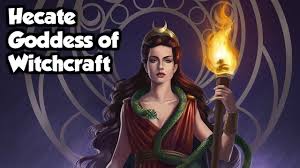Like Persephone, who was the queen of the underworld, Hecate, a daughter of two Titans, was considered a chthonic divinity; meaning that she spent most of her time under the surface of the Earth. She is often depicted holding a torch and a key. That is because she was able to unlock the gates between different realms – allowing people to communicate with the souls of the dead and supernatural beings from different realities.
Hecate as a Goddess of Necromancy
Due to her ability to create portals and points of connections between different realms, Hecate was considered to be the goddess of Necromancy. Necromancy is the practice of communicating with the dead to reveal secrets about the past, the present, and the future. This was a common practice in ancient Greece; visiting oracles for guidance was generally accepted and Hecate was a well-perceived and respected goddess. The ancient “mediums” would communicate not only with the spirits of the dead but also with the gods to receive information that would be taken into consideration for important strategic decisions.
Ghosts in Ancient Greece
Since necromancy is associated with ghosts, the souls of the dead, Hecate was also the goddess of ghosts. Ghosts in ancient Greek were neither bad nor good. Sometimes they helped people make important decisions with prophecies, other times they would cause panic. And the most popular evil ghost of ancient times was Taraxippus – the ghost often caused panic to horses during horse races and battles. The ghosts were also blood-thirsty, similar to vampires, and if someone needed to consult them, sacrificing an animal was usually required.
Hecate as a Goddess of Witchcraft and Witches
Hecate was also the goddess of witches, witchcraft, and magic. She had a familiar which was a dog and not a cat! The goddess was nocturnal and knew a lot about herbs. She was therefore able to craft potions and medicines. �?Dandelion, garlic, and lavender are some of the herbs that are associated with her. She is believed to give blessings to witches by offering her knowledge and rumor has it that she lurks in crossroads. Even today, crossroads in Greece are believed to be places that are favored by witches.
Hecate’s Cult
Hecate had many followers in ancient Greece and her shrines were often placed at a home’s doorway or at public crossroads. In ancient Athens, a pillar dedicated to the goddess was located in a crossroad that led to the Acropolis, the sacred rock of Athens. Sanctuaries of the goddess were found in the town of Lagina, in Argolis, on the island of Aigina and many other places. In the island of Samothrace, people would often use a ritual that involved Hecate that was believed to protect them from storms and other terrors. The rituals unfortunately involved the sacrifice of dogs.
Hekate’s Deipnon
Deipnon in Greek means dinner. Every new moon, Ancient Athenians would honor Hecate and the souls of the dead by serving an additional meal for her. Hecate’s deipnon was also used as a method of purification of the house – a way to appease any angry ghosts that were roaming the house.
Ancient Greek Witchcraft, Curses, and Spells
Archaeological findings have shown that ancient Greeks often practiced witchcraft and cast spells/curses to win a battle, attract a love interest, make money, and generally succeed in life. The process involved writing spells or curses on tablets and/or use figurines that could be compared to voodoo dolls. These objects would be thrown into the graves of those who had recently passed-away.
The ancient Greeks believed that the souls of the dead were messengers between different realms – the ones who recently died would carry these messages with them to the underworld and then Pluto, Persephone, Hecate or any other chthonic divinity would use their powers in favor of the spell caster. It is not clear whether the latter would have to pay a “price” for the “service”.
A great example would be the discovery of 30 curse tablets in a well in the ancient Greek cemetery of Kerameikos. The people who cast the curses were asking for the help of various chthonic gods and goddesses. You can find images here (the text is in Greek). Although witchcraft was generally accepted, “black” magic and casting curses were not only considered unethical, but also illegal. However, in ancient Athens, there was one exception: before a battle, all Athenians would be invited for a public curse session against the enemy (source also in Greek).

